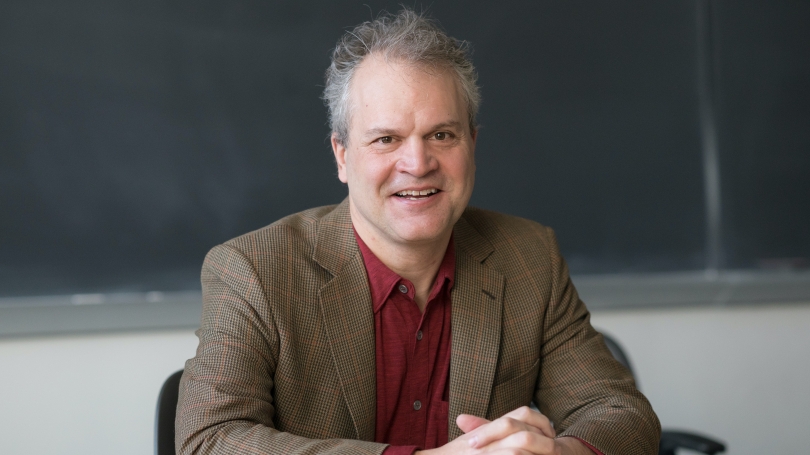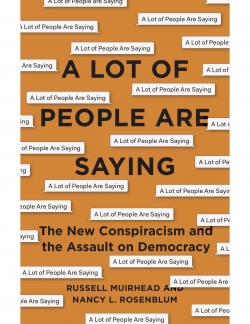

This week: Russell Muirhead kicks off Rocky Watch, an interactive virtual policy forum.
Centers and institutes across Dartmouth are exploring ways to continue their public events and maintain community during the COVID-19 pandemic. Over the coming weeks, Dartmouth News will write about some of the creative solutions that have emerged. Next week: public programming in the Dartmouth arts community.
The Nelson A. Rockefeller Center for Public Policy has launched Rocky Watch, a weekly series of live broadcasts that the center hopes will foster a virtual common space for community discussion in this time of social distancing and remote learning.
Leading off the Zoom-based program is Russell Muirhead, the Robert Clements Professor of Democracy and Politics and interim director of the Rockefeller Center. Muirhead will speak on "Conspiracy Without the Theory: How conspiratorial thinking is undermining democracy—and what can be done about it," followed by a public discussion. The event begins tonight, April 8, at 5. There is a link to the Rocky Watch series on the Rockefeller Center webpage.
Centers and institutes have been scrambling for ways to maintain and build the kind of public engagement, debate, and discussion that is the life blood of the liberal arts education. Some, like the Rockefeller Center, have set up a beta version, others are very close, and still others are allowing this new public space to grow organically.
For example, the Hopkins Center for the Arts has launched Hop@Home, the Hood Museum of Art is producing a series of art appreciation webinars, and the Student Wellness Center has a wide range of online wellness programming. Some, such as the John Sloan Dickey Center for International Understanding, and the Collis Center for Student Involvement, are developing programming and reaching out to the community for ideas and input. There are new initiatives coming online every day.
Muirhead says it is inspiring to see students, faculty, and staff across the institution coming together on the fly to brainstorm new ways to engage and sustain the intellectual and cultural life of Dartmouth under the new reality of the COVID-19 pandemic. Nobody has a roadmap, so the point is to try something to get the ball rolling, he says.
"Rocky Watch is an experiment. We'll see how it goes—whether there's any audience for it. People are adapting to this new reality, so we're just trying to adapt and see if this works. If it does, we'll do more of it. If it doesn't, we'll try something else," Muirhead says. "It was really an initiative of the Rocky staff to see if they can make something happen."

For the first episode of Rocky Watch, Muirhead will draw on his latest book, A Lot of People Are Saying: The New Conspiracism and the Assault on Democracy, co-written with Nancy Rosenblum, a professor of government at Harvard. Muirhead plans to talk about the current rise of conspiracy narratives that are completely detached from any fact-based reality, and he will discuss how this phenomenon has hindered the government's response to the COVID-19 pandemic.
"I think what we're looking at right now is a government that's having a heck of a time responding to facts—they're very slow in responding to the reality of pandemic, and one of the reasons for that is this ingrained mindset of conspiracy," Muirhead says.
After more than a week of working out the technology and logistics of remote learning, Muirhead says he is seeing a strong appetite among students and faculty to get back to substantive discussions of ideas. People seem to be craving face-to-face contact as opposed to viewing prerecorded content during this time of social isolation, he says.
"A lot of students are opting for synchronous contact. I've heard from professors who are having their students vote in their classroom about what they want to do, that students are saying 'we want to be in the class together at the same time,' " Muirhead says. "So maybe there will be even more demand for a live event like Rocky Watch where you can be present with other people, even if it is mediated by technology."
Visit the Dartmouth events calendar on the Dartmouth homepage for scheduled public programming. In addition, many centers and programs are building up their online presence in the wake of the pandemic, such as the Leslie Center for the Humanities, the Magnuson Center for Entrepreneurship, and Wellness at Dartmouth,. Check program websites for up-to-date listings.
For the latest information on Dartmouth's response to the pandemic visit the COVID-19 website.
William Platt can be reached at william.c.platt@dartmouth.edu.